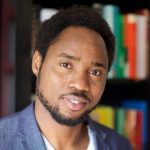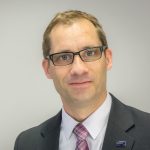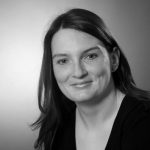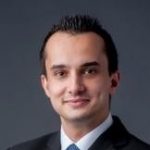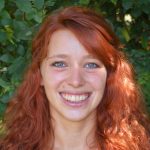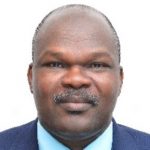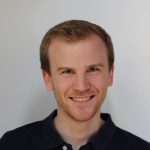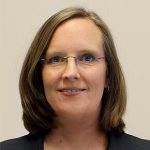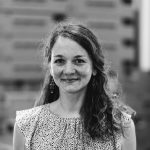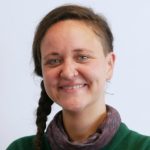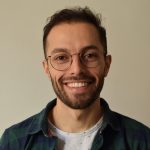Mohammed Abass
Mohammed Abass holds a M.Sc. in Mechanical Engineering from University of Duisburg-Essen, Germany, and a B.Sc. in Physics from Kwame Nkrumah University of Science and Technology, Ghana. In his master’s program, he specialized in Energy and Environmental Engineering and wrote his master’s thesis at WestfalenWIND, where he modified a 40ft. cooling container into an off-grid cooling container that was powered by Photovoltaic (PV)-hybrid system. For the EnerSHelF project, he now supports WestfalenWIND in setting up the PV-hybrid container at the pilot site in Kologo.
Ana Maria Perez Arredondo
Ana Maria Perez Arredondo recently joined the International Centre for Sustainable Development (IZNE) at Bonn-Rhein-Sieg University of Applied Sciences as a researcher within the framework of the EnerSHelF project. She is a doctoral student at the Center for Development Research (ZEF), University of Bonn, and part of the One Health and Urban Transformations Graduate School. Her doctoral thesis covers topics on One Health governance, and the social and environmental determinants of health in Accra, Ghana. Before starting her doctoral studies, she worked for the PPP on Climate Risk Transfer and Agricultural Insurance between the German Corporation for International Cooperation (GIZ) and Swiss-Re, and for the Agricultural Unit of the United Nations Economic Commission for Latin America and the Caribbean (ECLAC). She holds a MSc. of International Agribusiness and Rural Development Economics from the Universities of Gottingen in Germany and Talca in Chile (2016), and a Bachelor of International Business from the University of Guadalajara in Mexico (2013).
Rone Yousif
Rone Yousif holds a Master of Engineering with a focus in mechatronics. He graduated from University of Applied Sciences Bonn-Rhein-Sieg (H-BRS) and conducted his master’s thesis at the International Center of Sustainable Development focusing on the impact of aerosols and clouds on solar energy. Rone Yousif has both an experimental and a theoretical background, including field measurement campaigns and model development in the field of energy meteorology and solar energy. Besides his activities in the EnerSHelF project, Rone is responsible for the supervision of the weather station and energy-meteorological measurement station at H-BRS.
Prof. Harald Kunstmann
Harald Kunstmann is a professor and holder of the chair for regional climate and hydrology at the University of Augsburg in joint appointment with the KIT campus Alpin, Garmisch-Partenkirchen. He studied physics in Marburg, Virgina/USA, and Heidelberg before getting his PhD. in Natural Environmental Sciences from ETH, Zürich. In 2001, he started as the head of the research group Regional Climate and Hydrology at the KIT-Campus Alpin before being appointed as the head of the Regional Climate Systems Department in 2004. In 2018, he was invited as an Honorary Research Associate to the School of Geography and the Environment at Oxford University. His research focuses on the impact of regional climate change on terrestrial hydrology. It comprises dynamic and statistical downscaling of meteorological fields, fully coupled and cross-compartmental regional atmospheric and hydrological modelling, modelling and observation of water and energy flows, the application of Commercial Microwave Links (CMLs) for precipitation determination as well as geostatistic merging of hydrometeorological variables.
Dr. Windmanadga Sawadogo
Windmanadga Sawadogo is a research associate at the chair of Regional Climate and Hydrology at the University of Augsburg. He holds a PhD. in Meteorology and Climate Science from the Federal University of Technology, Akure, Nigeria, and a M.Sc. in Climate Change and Energy from the University of Abdou Moumouni, Niamey, Niger. From 2017 – 2019, he was a visiting scholar at the Climate System Analysis Group (CSAG) at the University of Cape Town, South Africa. His research foci are meteorology, climate science, solar energy, wind energy, and regional climate models.
Dr. Catherina Cader
Catherina Cader is leading the research at Reiner Lemoine Institute for the EnerSHelF project. She is an expert in Geographic Information Systems (GIS) and rural electrification planning. She has been working at Reiner Lemoine Institute since 2012 and is the Deputy Head of the Research Unit Off-Grid Systems since January 2020. Catherina Cader holds a PhD in Geography from Justus Liebig University Giessen and a M.Sc. in Geography from Philipps University Marburg. She is particularly interested in rural electrification planning in countries of the Global South with consideration of renewable energy. By developing and applying GIS-based methods, she brings the spatial component into RLI research and the EnerSHelF project using open source software.
Prof. Katja Bender
Katja Bender is a development economist and professor for Economics, in particular Economic and Social Development Bonn-Rhein-Sieg University of Applied Sciences (BRSU). She is co-director of the International Centre for Sustainable Development (IZNE) and head of the international MBA-program ‘Corporate Social Responsibility (CSR) and NGO Management’. In 2017 she has been appointed Vice-President of the European Association for Development Research and Training Institutes (EADI). Her main research interests include the political economy of social protection and health systems development, interactions between institutional change and the diffusion of technologies (focus: photovoltaics; ‘digital health’) as well as understanding preferences for research-practice collaborations. Her working experience includes several Asian and African countries.
Callistus Agbaam
Callistus Agbaam is a Research Fellow at the International Centre for Sustainable Development (IZNE), Bonn-Rhein-Sieg University of Applied Sciences, Sankt Augustin. He holds a PhD in International Development at Ruhr University Bochum. He also holds two masters degrees: M.A. in Development Studies from University of the Western Cape, Cape Town, South Africa and M.A. in Development Management from the Institute of Development Research and Development Policy, Ruhr University Bochum, Germany. His research interest includes social protection, poverty and health equity, gender, political economy, sustainability and inclusive development.
Steven Denk
Steven Denk is a trained banker and has started working for WestfalenWIND in 2015. He is the project leader for the sector of renewable energies, especially the projecting and implementation of wind farms in Ostwestfalen-Lippe. Since 2018, he is working as the business developer of the newly implemented department WestfalenWIND Beyond. The focus of the department is to develop clean, reliable and sustainable energy supply in developing and emerging countries by transferring knowledge and providing up-front investment for energy solutions. They acknowledge their key role as a private actor to achieve the Sustainable Development Goals (SDGs) by investing in innovative initiatives to foster sustainable development and green growth.
Prof. Thorsten Schneiders
Thorsten Schneiders is a professor for energy storage at the Cologne University of Applied Sciences, Cologne, Germany. He is working at the Cologne Institute for Renewable Energy (CIRE), teaching on energy storage, renewable energy technologies, grid infrastructure, energy economics and policy. Additionally, he is supervising various research projects in the field of smart technologies in industry, energy management and energy efficiency, energy storage, electric mobility and integration of renewable energy into the energy supply system and grid infrastructure. Since 2017, he is heading the Virtual Institute Smart Energy – an interdisciplinary research platform for stakeholders from research public sector and industry to jointly research on the implications of digitization and smart technologies in the energy industry. Thorsten Schneiders brings in various years of experience from working in the private sector for the German electric utility company E.ON on renewable projects all over the world.
Prof. Stefanie Meilinger
Stefanie Meilinger is a professor for sustainable technologies at the International Centre for Sustainable Development at University of Applied Sciences Bonn-Rhein-Sieg (H-BRS). Her research foci are renewable energies, energy efficiency, sustainable mobility, and sustainable technological transformation processes. She studied philosophy and physics at Johannes Gutenberg Universität Mainz and Indiana University Bloomington, USA, before getting her PhD in environmental science from ETH Zürich in cooperation with the Max Planck Institute for Chemistry in Mainz. She then worked in various positions as a researcher and specialist in the public and private sector (e.g. Max Planck Institute for Chemistry, Environmental Resource Management GmbH, Lufthansa Systems AG, and Deutscher Wetterdienst). In 2013, she was appointed as a professor at H-BRS and is part of various international research projects on sustainable technological processes.
Dr. Seyni Salack
Seyni Salack is a senior climate scientist and coordinator of all research activities on “Risks and vulnerability to Climate Extremes” at WASCAL. He holds a PhD in Climate and Climate Impacts from the University Cheikh Anta Diop of Dakar, Senegal. He works on Climate extremes, Agricultural meteorology, Climate-Energy Nexus, Climate Change impacts, Near-surface Observation Systems, Sub-Seasonal-to-Seasonal forecasts, Climate modelling and Statistical Methods in Climate research. He is the author and co-author of many peer-reviewed publications and conference talks, supervisor of students’ theses, as well as team leader and investigator to many projects. At the top of more than 15 years’ experience in research, development actions and capacity building projects, he is now the lead scientist of the EnerSHelF project at WASCAL.
Samuel S. Guug
Samuel S. Guug is a research assistant and coordinator of the Vea/Sissili research basins at WASCAL, based in Bolgatanga, Ghana. He holds a Bachelor of Science (BSc) in Environmental Sciences and Master of Philosophy (MPhil) in Soil and Water Conservation and Management from the University for Development Studies at Tamale. He has over seven years of working experience in hydro-meteorological instrumentations and has since been in charge of the WASCAL observation networks at the Vea/Sissili basins in Ghana and Southern Burkina Faso.
Dr. Samantha Antonini
Samantha Antonini is a project and research manager at the International Centre for Sustainable Development (IZNE) at Bonn-Rhine-Sieg University of Applied Sciences in Sankt Augustin. Samantha holds a PhD in Agricultural Sciences from the University of Bonn, an MSc in Environmental Diagnosis from Imperial College London, and a BSc in Geography and Environmental Sciences from Sussex University. Her research background and interests are wastewater treatment, nutrient cycling from wastewater and Ecological Sanitation Systems.
Dr. Kennedy A. Alatinga
Dr. Kennedy A. Alatinga is a Senior Lecturer and Dean of the Faculty of Planning and Land Management at the University for Development Studies (UDS), Tamale, Ghana. Dr. Alatinga holds a PhD in Public Policy and Administration and a Master of Public Administration from the University of the Western Cape, South Africa. He also holds a Master of Arts degree in Development Management from the Ruhr University in Germany, and a Bachelor of Arts degree in Integrated Development Studies from UDS.
Samer Chaaraoui
Samer Chaaraoui is a Research Fellow at the International Centre for Sustainable Development (IZNE), Bonn-Rhine-Sieg University of Applied Sciences, Sankt Augustin. He holds a master’s degrees in Renewable Energy and a bachelor’s degree in Mechanical Engineering from the University of Applied Sciences Cologne, in which he worked in several laboratories and institutes. He also worked in an international corporation based in Germany prior to his work at the IZNE, prior to his return to the science domain. His main research interest includes control engineering, artificial intelligence and the promotion of alternative energy resources.
Sarah Rabe
Sarah Rabe is a geographer with a specialization on the interaction between society and environment. After finishing her master’s degree at the University of Cologne in 2019, she gathered working experiences within the German development sector at the Federal Ministry of Economic Cooperation and Development (BMZ) and the Deutsche Gesellschaft für Internationale Zusammenarbeit (GIZ). Additionally, she worked as a lecturer at the University of Cologne. Since July 2020, she is part of the EnerSHelF project and based at the University of Applied Sciences Bonn-Rhein-Sieg (H-BRS). Within the project, she is responsible for the interdisciplinary cooperation between the different branches. Besides working at the H-BRS, she is currently doing her PhD in Geography at the University of Cologne.
Dr. Emmanuel Ramde
Dr. Emmanuel Ramde is a mechanical engineer, energy specialist, and project management, monitoring and evaluation expert. He is presently a senior lecturer and the immediate past director of The Brew-Hammond Energy Centre, Kwame Nkrumah University of Science and Technology (KNUST), Kumasi, Ghana. From 2012 to 2019, Dr. Ramde has served as the Ghana National Representative of the African Network for Solar Energy (ANSOLE) and is its Vice Regional Representative in West Africa since 2012. Dr. Ramde has about sixteen years of experience in designing, implementing, managing, monitoring, and evaluating energy projects and is a reviewer for several academic journals.
Matthias Bebber
Matthias Bebber is a master student in mechanical engineering at the University of Applied Sciences Bonn-Rhein-Sieg (H-BRS). After completing his bachelor’s degree in mechanical engineering with a focus on mechatronics, he continued with his master’s degree at H-BRS. His master’s projects and thesis are situated at the International Centre for Sustainable Development (IZNE) at H-BRS within the EnerSHelF project.
Silvan Rummeny
Silvan Rummeny is a reasearcher and a doctoral candidate at the Cologne Institute for Renewable Energy (CIRE) of the University of Applied Sciences Cologne (TH Köln). After his bachelor’s degree in biomimetics and master’s degree in renewable energy, he worked on several projects at CIRE. His field of research is the planning of renewable based micro and mini grids. In his doctoral thesis, he creates a planning guideline and advisor planning tool for implementing such cellular power systems. He also is actively involved in the VDE ETG Technical Committee for Cellular Energy Systems. The project, which enables the utility of Bordesholm to achieve a microgrid capability, was awarded by the German Solar Prize 2020.
Paul Bohn
Paul Bohn is a master student in Renewable Energies (M.Sc.) at the University of Applied Sciences Cologne (TH Köln). Prior to his masters, he obtained a B.Eng. in Renewable Energies at TH Köln in 2020. He is a trained industrial mechanic and completed his vocational training from 2012-2015 at the Dürr Dental AG in Bietigheim-Bissingen. Since October 2021, he is working as a research associate in the EnerSHelF project.
Jonas Bauhof
Jonas Bauhof is a research assistant at the International Centre for Sustainable Development (IZNE), Bonn-Rhein-Sieg University of Applied Sciences, Sankt Augustin. He also works as a project assistant at the European Association of Development Research and Training Institutes. He holds a M.Sc. in Global Development from Copenhagen University and a B.A. in European Studies from University of Bremen.
Susanne von Itter
Susanne von Itter is Executive Secretary of EADI and holds a degree in Geography, with a focus on ecology and environment. As the Director of the EADI head office in Bonn, Germany, she has considerable experience working on management of collaborative research projects. Susanne has also worked extensively on policy-oriented research communication and management of high-level events. She has coordinated seven EADI General Conferences and a large number of scientific events in Europe. She has led the EADI strategy on information services for many years, transforming the EADI website into an information portal with cutting edge information on European and international development issues.
Katrin Lammers
Katrin Lammers works at the Reiner Lemoine Institute as a researcher specializing in supporting the design of off-grid energy systems that can withstand climate change impacts. She is currently completing her doctoral dissertation, which examined electricity access and climate change impacts on Southeast Asian islands. Sustainable electricity access is a prerequisite for many adaptation measures. Therefore, she investigated what climate resilient energy systems can look like to maintain positive adaptation potentials for local communities. Katrin is concerned about climate change and wants to integrate climate change risk assessments into energy system planning. She is particularly passionate about environmental protection, the energy transition, and social justice.
Avia Linke
Avia Linke works as a researcher in the unit Off-Grid-Systems at RLI gGmbH. Prior to that she was already a student assistant at the RLS Graduate School. Avia holds a bachelor’s degree in Engineering Science with a focus on fluid dynamics and thermodynamics from TU Berlin. In her bachelor’s thesis, she dealt with PIV flow investigation in a stenosed aorta. Her master’s thesis, which she wrote together with a fellow student, concerned the design, construction, and testing of a micro wind turbine for battery charging. Besides her work at RLI, she supports political and scientific educational workshops, is involved in climate justice, climate action and political music festivals.
Andrés Andrade
Andrés Andrade works as a student assistant at the Reiner Lemoine Institute since May 2021. He is currently enrolled in the master’s degree program Geodesy and Geoinformation Science at the Technical University of Berlin. As part of his master’s thesis, Andrés supports the EnerSHelF team by co-developing a web map tool for the visualization of healthcare facilities, their surrounding communities, and the potential strategies for their electrification. Andrés is particularly interested in the application GIS-based and data-driven methods in questions of urban development, from transport, to land-development and energy systems. He holds a bachelor’s degree in Liberal Arts and Sciences from the University of Freiburg, where he wrote his dissertation on the automatic classification of urban 3D point clouds using deep neural networks.
